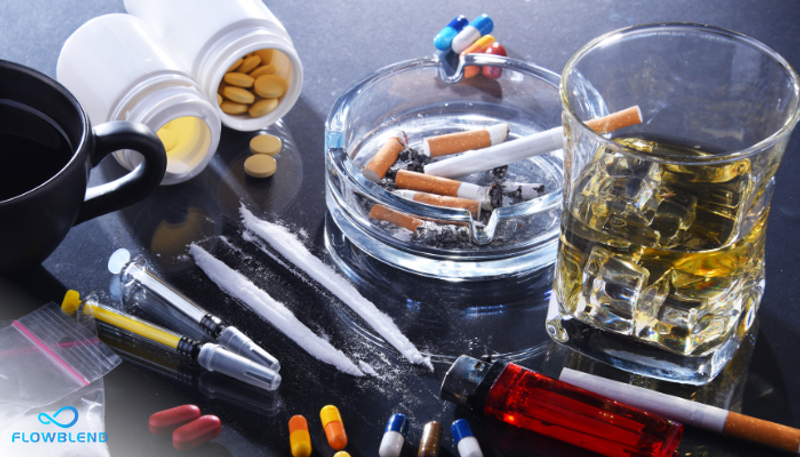In our relentless pursuit of knowledge about all things related to CBD and Nootropic Pouches, we jump in first into the intriguing world of addiction. This article serves as a beacon of information, guiding you through a variety of the possibilities involving addiction and highlighting its significance, operation, advantages, and alternatives.
Ready to break free from addiction and explore healthier alternatives? Take the first step towards a brighter future. Explore into our addiction guide now with FlowBlend!
What Is Addiction?
Let's kick things off with a fundamental question: What is addiction? Addiction is a complex psychological and physiological phenomenon wherein an individual becomes dependent on a substance, behavior, or activity. It's a compelling force that can exert a powerful grip on one's life, often leading to detrimental consequences.1

Unlock Your Path To Freedom With FlowBlend!
|
Why Is Understanding Addiction Important?
Understanding addiction is of paramount importance as it unveils the intricate web of factors that contribute to its grip on individuals, their families, and society at large. It provides the knowledge needed to recognize the signs, offer support, and seek help for those affected. By comprehending addiction's significance, we can collectively work towards prevention and treatment strategies, reducing its devastating impact on physical and mental health, relationships, and communities. Moreover, understanding addiction fosters empathy and compassion, essential components in assisting those in their journey towards recovery and leading healthier, more purpose-driven lives.
How Does Addiction Occur?
To comprehend addiction fully, it's essential to grasp its inner workings. How does addiction occur? Addiction involves changes in the brain's reward circuitry, leading to compulsive behavior and a craving for the addictive substance or activity. Neurochemical processes play a significant role, contributing to the cycle of dependence.
What Benefits Does Addiction Treatment Offer?
Addiction treatment offers a multitude of benefits, ultimately leading to improved physical, mental, and emotional well-being. Firstly, it provides individuals with the tools and strategies to break free from the cycle of addiction, enabling them to regain control over their lives. Treatment also addresses the underlying causes and co-occurring mental health issues, fostering long-term recovery and preventing relapse. Moreover, it helps rebuild strained relationships and offers a supportive community of peers and professionals who understand the challenges of addiction. Overall, addiction treatment empowers individuals to lead healthier, more fulfilling lives, aligning with their goals and purpose beyond addiction's grasp.2
What Are The Alternatives To Addiction?
For those seeking a way out or alternatives to addiction, there is hope. What are the alternatives to addiction? Replacing addictive behaviors with healthier alternatives, seeking professional help, and finding support from friends and family are essential steps in breaking free from the cycle of addiction. Products like CBD and nootropics can also play a role in this journey.
How Does Nicotine Addiction Fit Into The Broader Context Of Addiction?
Nicotine addiction, while specific in its manifestation, shares common threads with the broader spectrum of addiction. It's a puzzle piece in the intricate mosaic of addictive behaviors and substances. Nicotine addiction is just one facet of this complex phenomenon, which encompasses various substances and behaviors that exert a compelling grip on individuals.
What Are The Health Risks Associated With Addiction?
The perils of addiction extend beyond the initial allure. What are the health risks associated with addiction? From nicotine to other addictive substances, the consequences can be severe. Here's a glimpse into the health hazards that often accompany addiction:
Physical Health Risks
The repercussions of addiction are profound, manifesting in the form of damage to vital organs, an elevated risk of chronic diseases, and a compromised immune system. These consequences underscore the urgent need for awareness, prevention, and effective management of addiction, emphasizing the importance of adopting healthier lifestyles and seeking professional guidance to break free from its grasp.3
Mental Health Implications
Addiction's toll on mental health is a stark reality, with individuals often grappling with anxiety and depression as a result. Moreover, cognitive impairment can further exacerbate the challenges faced, affecting daily functioning and decision-making. Additionally, addiction frequently coexists with other mental disorders, amplifying the complexity of treatment and recovery.4 Addressing these mental health aspects alongside addiction is essential for comprehensive care and improved overall well-being.
Social and Emotional Impact
The far-reaching consequences of addiction extend beyond individual well-being, often causing strained relationships due to the behavioral changes and conflicts it can generate. This isolation and withdrawal from social circles compound the emotional burden. Furthermore, addiction can lead to legal entanglements and financial hardships, as individuals grapple with the fallout of their addictive behaviors. These multifaceted challenges emphasize the urgent need for holistic support, rehabilitation, and guidance to reclaim a fulfilling and balanced life free from the shackles of addiction.
How Does Addiction Affect The Body?
Understanding the physiological impact of addiction is crucial. How does addiction affect the body? It goes beyond the mind, infiltrating various bodily systems:
- Neurochemical Changes: Addictive substances disrupt the brain's reward circuitry, leading to cravings and compulsive behavior.5
- Cardiovascular System: Smoking, for instance, damages blood vessels and increases the risk of heart disease.6
- Respiratory System: Nicotine and other addictive substances harm the lungs, contributing to respiratory illnesses.7
- Liver and Kidneys: Substance abuse can overload and damage these vital organs.8
- Endocrine System: Addiction can disrupt hormonal balance, affecting metabolism and overall health.9
What Are The Strategies Or Ways To Prevent And Control Addiction?
Empowerment lies in understanding how to prevent and manage addiction. Here are strategies and methods to guide you:
Preventing Addiction
- Education: Knowledge is a potent weapon. Educate yourself and others about the risks of addiction.
- Healthy Coping Mechanisms: Encourage stress management through exercise, meditation, or creative outlets.
- Support Networks: Build a strong support system to help navigate life's challenges.
Controlling Addiction
- Seek Professional Help: Consult addiction specialists and therapists for tailored treatment plans.
- Support Groups: Joining support groups like Nicotine Anonymous can provide invaluable assistance.
- Medication: In some cases, medications may aid in addiction recovery by reducing cravings.
What Are The Key Takeaways About The Science Of Addiction?
Summing up the science of addiction, these key takeaways emerge:
Complexity
Addiction is a multifaceted interplay of genetic, environmental, and neurobiological factors.10
Physical and Psychological
It affects both the body and mind, altering neural pathways and behavior.
Treatment is Possible
Recovery is achievable through a combination of behavioral therapy, medications, and support.
Prevention Matters
Understanding the risks and adopting preventive measures is the first line of defense.
Final Thoughts On Addiction
As we conclude our in-depth journey into the world of addiction, it becomes evident that addiction is a multifaceted challenge that affects not only the individual but also their loved ones and society at large. We've explored the intricate web of nicotine addiction within the broader context of addictive behaviors, highlighting its health risks, impact on the body and mind, prevention strategies, and the science behind it all.
In this pursuit of understanding, we want to offer a beacon of hope and support for those embarking on the path to recovery. FlowBlend, our CBD and Nootropics pouches, emerges as a valuable ally in the battle against nicotine addiction. By optimizing brain and body functions, FlowBlend empowers individuals to reclaim control over their lives and align with their goals and purpose. It's a step towards a brighter, addiction-free future.
Your journey toward a healthier, more purpose-driven life starts here. Choose FlowBlend to elevate your cognitive function, enhance your physical well-being, and break free from the shackles of addiction. With FlowBlend by your side, you're not alone in this endeavor – you're equipped to thrive.
Frequently Asked Questions About Addiction
Can CBD help with addiction recovery?
Some studies suggest that CBD may be beneficial in managing addiction-related cravings and anxiety, but it's essential to consult a healthcare professional for guidance.
Is addiction a choice or a disease?
Addiction is considered a disease as it involves changes in brain structure and function, leading to compulsive behavior.
What are nootropic pouches, and how do they relate to addiction recovery?
Nootropic pouches contain substances that may enhance cognitive function, focus, and energy. While they can be used as alternatives to addictive substances, it's crucial to use them responsibly and in consultation with experts.
Are there support groups for addiction recovery?
Yes, various support groups, such as Alcoholics Anonymous and Narcotics Anonymous, provide a valuable community and resources for individuals in recovery.
What Causes Nicotine Addiction?
Nicotine addiction typically arises due to the stimulating and mood-altering effects of nicotine found in tobacco products. This substance activates the brain's reward system, creating a cycle of dependence.
Can I Develop Addiction to Nootropic Pouches?
While nootropics are often used to enhance cognitive function, there is a potential for dependency, especially when used in excess or without proper guidance. Nootropic pouches should be used responsibly and in consultation with experts.
Are There Non-Addictive Alternatives to Nicotine Products?
Yes, there are non-addictive alternatives available to help quit nicotine products. These include nicotine-free cessation aids, behavioral therapy, and support groups, which focus on breaking the psychological and physical addiction to nicotine.
How Can I Support a Loved One Struggling with Addiction?
Supporting a loved one through addiction can be challenging but crucial. Offer empathy, encourage them to seek professional help, and provide emotional support. Joining family therapy or support groups can also be beneficial in navigating this journey together.
Are There Different Types of Addiction?
Yes, addiction can manifest in various forms. Beyond substance addiction like nicotine or alcohol, there are behavioral addictions such as gambling, internet addiction, or shopping addiction. These addictions share common characteristics, including a loss of control and negative consequences.
Is Relapse a Normal Part of Addiction Recovery?
Relapse is a common challenge in addiction recovery and should not be seen as a failure. It often takes multiple attempts to achieve lasting sobriety. It's essential to view relapse as a learning opportunity and seek additional support and strategies to prevent it in the future.
Can Children and Teens Develop Addiction?
Yes, addiction can affect individuals of all ages, including children and teenagers. It is essential for parents and guardians to be aware of the signs of addiction in young people and seek appropriate help and intervention if necessary. Early intervention and support are crucial in addressing addiction in adolescents.
Sources:
- Köpetz, C. E., Lejuez, C. W., Wiers, R. W., & Kruglanski, A. W. (2013). Motivation and Self-Regulation in Addiction. Perspectives on Psychological Science, 8(1), 3–24. https://doi.org/10.1177/1745691612457575
- National Institute on Drug Abuse. (2020, July 10). Treatment and Recovery. National Institute on Drug Abuse. https://nida.nih.gov/publications/drugs-brains-be...
- NIDA. (2020). Drug Misuse and Addiction. National Institute on Drug Abuse. https://nida.nih.gov/publications/drugs-brains-be...
- National Institutes on Drug Abuse. (2020). Common Comorbidities with Substance Use Disorders Research Report. In PubMed. National Institutes on Drug Abuse (US). https://www.ncbi.nlm.nih.gov/books/NBK571451/
- Koob, G. F., & Volkow, N. D. (2016). Neurobiology of addiction: a neurocircuitry analysis. The Lancet Psychiatry, 3(8), 760–773. https://doi.org/10.1016/s2215-0366(16)00104-8
- CDC. (2019, June 25). Heart Disease and Stroke. Centers for Disease Control and Prevention. https://www.cdc.gov/tobacco/basic_information/hea...
- Abuse, N. I. on D. (2021, April 6). Cigarettes and Other Tobacco Products DrugFacts. National Institute on Drug Abuse. https://nida.nih.gov/publications/drugfacts/cigar...
- Epstein, M. (1997). Alcohol’s Impact on Kidney Function. Alcohol Health and Research World, 21(1), 84–92. https://www.ncbi.nlm.nih.gov/pmc/articles/PMC6826...
- karimian, M., & Famitafreshi, H. (2021). Hormones Can Influence Drug Addiction-A Narrative Review. BioMedicine, 11(2), 5–10. https://doi.org/10.37796/2211-8039.1120
- Ducci, F., & Goldman, D. (2012). The Genetic Basis of Addictive Disorders. Psychiatric Clinics of North America, 35(2), 495–519. https://doi.org/10.1016/j.psc.2012.03.010

